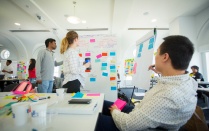Refugee Health and Well-being in Buffalo

Courtesy of Jewish Family Services of Buffalo and Erie County
From 2003 to 2014, Erie County's four resettlement agencies resettled 9,723 refugees from Iraq, Somalia, Burma, Bhutan, and now Syria. Refugees receive resettlement support for three months time but, post-resettlement, face barriers to good health and well-being due to limited english proficiency coupled with a scarcity of interpreters and translators, mental health issues related to trauma and torture, lack of transportation, and a derth of culturally-engaged health professionals, pharmacists, and emergency care providers.
What is Refugee Health and Wellbeing?
By Isok Kim
Refugees have escaped war, persecution, or natural disasters and have often witnessed or experienced physical and/or psychological trauma or torture. Some arrive with English skills learned at schools from their home or host countries but some arrive lacking the language skills needed to thrive.
Refugee health translates to overall wellbeing . I believe that attending to refugee health requires “it takes a village…” approach, which encourages and fosters collaboration across all civic sectors, including healthcare clinics, resettlement agencies, social services, schools, and local government and business communities.
How does Refugee Health Impact Global Health Equity?
By Kim Griswold
During migration, refugees' health and wellness is vulnerable due to lack of consistent, continuous medical care – including gaps in maternal child care, mental health and preventive care.
Once resettled, refugee populations are eligible for medical care, required vaccines and evidenced based preventive and primary care. However, there are challenges in the delivery and receipt of care due to language barriers, cultural perceptions on the part of both refugees and providers of care, health literacy issues, and differences in the understanding and treatment of mental health disorders. Global health is affected adversely when populations do not receive optimum medical care. A high standard of medical care helps to ensure prevention of disease, control of chronic illness and health of mothers and children – which safeguards the health of all.
Health centric disciplines are not enough to meet the challenges presented by these newly arriving populations, nor to alleviate the disparities they face – such as isolation, limited English proficiency, differences in patients’ attitudes and health literacy levels, and a lack of cultural awareness on the part of providers.
In caring for individuals and families from all over the world, I have tried to comprehend the trauma and loss they have withstood; and have been captivated by their resilience and ability to transform their lives.
Our Working Solutions
Our Team
Co-Lead, Refugee Health and Wellbeing team; Project Lead, Reproductive Health Decision-Making; Assistant Professor
School of Nursing
Hertel Elmwood Internal Medicine Center 900 Hertel Ave. Buffalo, NY 14216
Phone: 716-871-1571
Email: rod2@buffalo.edu

Joseph Gambacorta
Assistant Dean, Clinical Affairs
School of Dental Medicine
Professor; Director of Undergraduate Studies, Environmental Engineering
Department of Civil, Structural and Environmental Engineering
Co-Lead, Refugee Health and Wellbeing team; Associate Professor
Educational Leadership and Policy
Founding Co-lead, Community for Global Health Equity; Professor
Department of Industrial and Systems Engineering
Associate Professor and Director of Graduate Studies
Department of Community Health and Health Behavior
Co-Director and Founding Co-Lead, Community for Global Health Equity; Co-Lead, Food Equity Team; Project Lead, Plan REFUGE; Professor
Urban and Regional Planning
Founding Co-Lead, Community for Global Health Equity; Professor and Chair
Department of Architecture
Phone: 716-575-2874
Email: khsmith@buffalo.edu

Nicole Little
UB Alumna; Former Graduate Assistant
MArch, MUP

Biplab Bhattacharya, PhD
UB Alumnus; Former Graduate Assistant
Industrial and Systems Engineering and Community for Global Health Equity
Email: biplabsu@buffalo.edu

Danielle Vasquez
Graduate Student
Management and Public Health and Health Professions





























